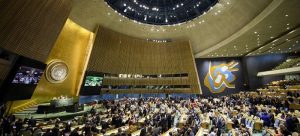World leaders have adopted the Pact for the Future, a landmark declaration pledging concrete actions towards a safer, more peaceful, sustainable and inclusive world for tomorrow’s generations.

The leaders adopted the Pact at the two-day Summit of the Future held at the 79th session of the UN General Assembly (UNGA 79) High-level Week in New York.
UNGA 79 opened on September 10, 2024, while the High-Level Week began on Friday, and it will run through Sept. 27.
The Pact along with its annexes, the Global Digital Compact and the Declaration on Future Generations, was adopted by consensus, in spite of a last-minute proposal for an amendment by some countries, including Russia, Iran, the Democratic People’s Republic of Korea (DPRK) and Syria.
The amendment sought to incorporate text calling for non-intervention in any issue of national sovereignty, and the primacy of intergovernmental deliberation, in effect, downplaying the role of the civil society or private sector interests.
It was rejected after the 193-member Assembly decided not to act on the proposal.
The Pact’s five broad focus areas include: sustainable development; international peace and security; science and technology; youth and future generations and transforming global governance.
This has become an urgent pivot, as multilateral financial institutions and even the United Nations itself have come up short seeking solutions to 21st century problems, the pact lays out.
The Global Digital Compact marks the first truly worldwide agreement on the international regulation of artificial intelligence (AI) and is founded on the idea that technology should benefit everyone.
It outlines commitments to ensure that digital technologies contribute to sustainable development and human rights, while addressing risks like digital divides, cybersecurity, and misuse of technology.
The Compact aims to bridge the digital divide and ensure AI technologies are used responsibly, fostering global cooperation on both AI capabilities and security threats. Governments are also obligated to form an impartial worldwide Scientific Panel on AI and start an international conversation about AI governance inside the UN.
The Declaration on Future Generations focuses on securing the well-being of future generations, also highlighting the need to include their interests in decision-making processes.
It also underlines the importance of protecting the environment, promoting intergenerational equity, and ensuring that long-term consequences of today’s actions are considered
Speaking after the adoption, Secretary-General Antonio Guterres emphasised that the Pact for the Future and its annexes, “open pathways to new possibilities and opportunities.”
“People everywhere are hoping for a future of peace, dignity, and prosperity.
“They are crying out for global action to solve the climate crisis, tackle inequality, and address new and emerging risks that threaten everyone,” he said.
“They see the United Nations as essential to solving these challenges,” he continued, adding, “The Summit of the Future sets a course for international cooperation that can meet their expectations … now, let’s get to work.”
The adoption was the culmination of months of negotiations co-facilitated by Germany and Namibia.
Speaking after the adoption, Philémon Yang, President of the 79th session of the General Assembly, urged nations to move forward, together, in a spirit of solidarity and multilateral cooperation.
“The path we choose must lead to a future where human dignity is respected and human rights are upheld. A future where peace transcends the mere absence of conflict and is grounded in justice, inclusion, and equity.”
By endorsing the Pact, UN Member States pledged, among other things, turbocharge the Sustainable Development Goals (SDGs) and the Paris Agreement on climate change, two landmark 2015 agreements that have seen halting progress and missed milestones.
Meanwhile, Nigeria’s Minister of Foreign Affairs, Yusuf Tuggar, at the summit, called for collective support from the international community to help Africa tackle regional challenges on financing implementation of the Sustainable Development Goals (SDGs).
He commended most of the global South for significant support toward implementation of the SDGs 2030-Agenda, saying it is imperative to adopt measures to tackle challenges impeding development.
Tuggar said, “This is especially important in Africa, where economies are most vulnerable due to historical imbalances in the international multilateral system.
“The SDG Index estimates that only about 16 per cent of SDG targets are on track to be achieved. We must, therefore, ensure today’s adoption of Pact for the Future is backed by willingness to fulfil outstanding commitments.
“With the remaining 84 per cent of the SDG targets for 2030 yet to be achieved, countries in the global North must do more to support sustainable development in the global South.
“We are optimistic these targets can be met, if commitments are backed by action. However, in the event we fall short of achieving the SDG targets by 2030, the deadline should be extended.
“The collective resolve and support of international community could help Africa tackle regional challenges, particularly with regard to sustainable financing for the SDG implementation.”
He underscored the need for action-oriented measures to engender reform of the UN Security Council aimed at ensuring a permanent seat for Africa.
By Cecilia Ologunagba
